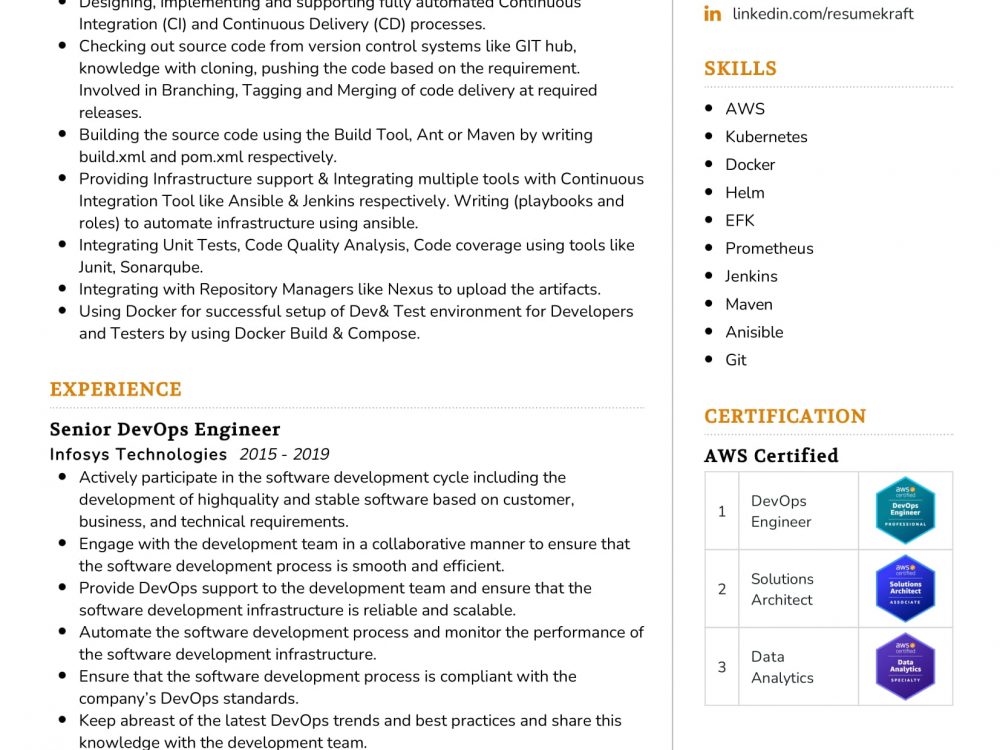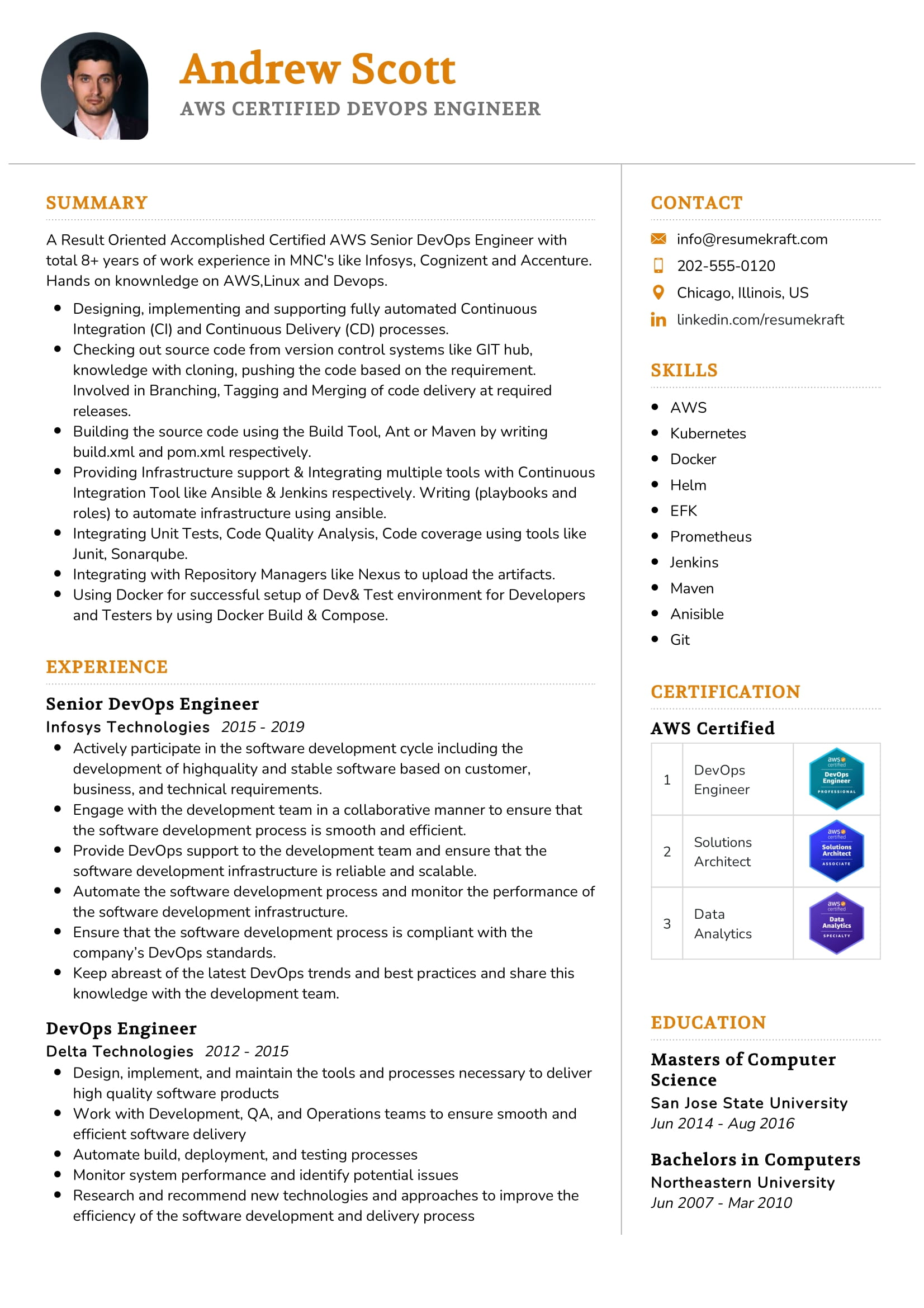What Should Be Included In A DevOps Engineer Resume?
Creating a resume for a DevOps Engineer position is no easy task, as the role requires a wide variety of skills and experience. A successful resume should include an effective summary statement, an appropriate skills section and a section highlighting relevant experience. It should also include technical and soft skills, both of which are important for a DevOps Engineer.
The summary statement should clearly communicate the candidate’s qualifications and strengths. It should also highlight the candidate’s technical skills and experience in a concise and effective way. The skills section should highlight the candidate’s strengths in areas such as cloud computing, system administration, scripting, automation and networking.
The experience section should feature accomplishments that highlight the candidate’s ability to successfully complete projects, manage resources and achieve objectives. It should also list any technical certifications that the candidate holds, as these are important for DevOps Engineers.
In addition to technical skills and experience, DevOps Engineers should have strong soft skills such as communication, problem-solving and collaboration. These soft skills should be highlighted in the resume, as employers view them as an important asset for a successful DevOps Engineer.
Finally, a successful DevOps Engineer resume should include relevant education information such as degrees, certifications and relevant courses. It should also list any awards or recognition that the candidate has received, as these demonstrate the candidate’s commitment to excellence. With all of these components in place, a DevOps Engineer resume should be well on its way to making a successful impression on employers.
What Skills Should I Put On My Resume For DevOps Engineer?
Writing a DevOps engineer resume can be a daunting task. It’s important to include the right skills and experiences to highlight your experience and show potential employers that you are qualified for the position. When crafting a resume for DevOps engineer positions, it’s important to consider the specific skills and qualities that employers are looking for.
The DevOps engineer role within an organization is typically responsible for developing and deploying software, as well as maintaining and improving system efficiency. To be successful in this role, DevOps engineers need to have a wide array of technical skills ranging from programming and scripting languages to software engineering, system architecture, and cloud computing.
When listing skills on your resume, it’s important to include specific technical skills related to the DevOps engineer role, such as automation and configuration management, version control, containerization, and database management. Additionally, employers will be looking for other soft skills such as problem-solving and communication skills.
Other skills employers might look for when reviewing DevOps engineer resumes include experience in database and server management, network security, and DevOps tools such as Chef, Puppet, Ansible, and Jenkins.
Overall, when crafting your DevOps engineer resume, it’s important to include the specific technical skills and qualities employers are looking for. From programming and scripting languages to software engineering and system architecture, DevOps engineers need to have a wide array of skills to be successful in the role. Additionally, employers will be looking for soft skills such as problem-solving and communication skills, as well as experience in DevOps tools. By including these skills and experiences on your resume, you will be putting your best foot forward to land the DevOps engineer position you’ve been aiming for.
What Is The Job Description Of The DevOps Engineer?
A DevOps engineer is a highly sought-after role in the tech industry and is usually employed in software engineering and development. The DevOps engineer is responsible for integrating various software elements together, such as database and application layers, in order to automate IT operations and facilitate continuous integration and delivery of applications. This role requires a lot of technical skills, knowledge, and experience.
The primary responsibility of a DevOps engineer is to develop and maintain the operational systems and processes that enable businesses to efficiently manage the infrastructure for their software projects. This includes tasks such as setting up and configuring build servers, scripting and automation tools, configuring and optimizing databases, and deploying applications.
The DevOps engineer must also know and be comfortable with cloud computing technologies, such as Amazon Web Services (AWS) and Microsoft Azure. They should be experienced in working with container-based solutions, such as Docker, and must be familiar with configuration management tools, such as Chef, Ansible, and Puppet. Finally, DevOps engineers should be comfortable with version control and repository management tools, such as Git and Subversion.
The job of a DevOps engineer requires the ability to work quickly and efficiently under pressure, and to be able to troubleshoot and resolve issues quickly. They must have strong communication skills, both written and verbal, and the ability to interact with various stakeholders. To be successful in this role, DevOps engineers must have a strong understanding of software engineering and development, be able to think critically, and have excellent problem-solving skills.
Ultimately, the job of a DevOps engineer is to ensure that the development process is running smoothly, efficiently, and with high quality results . This includes working with developers, operations teams, and other stakeholders to define and enforce best practices, automate processes, and maintain infrastructure. To do this, DevOps engineers must be comfortable with configuration management and automation tools, such as Chef, Ansible, and Puppet. They must also be familiar with version control and repository management tools, such as Git , Subversion, and Mercurial.
What Is A Good Objective For A DevOps Engineer Resume?
The objective of a DevOps Engineer resume is to highlight the technical skills, knowledge and experience the candidate has acquired in the field. A good DevOps Engineer resume should emphasize the candidate’s key skills and strengths that are directly relevant to the position they are applying for. It should also demonstrate the candidate’s ability to work efficiently with teams and tools to develop and maintain cloud infrastructure, automate processes, and implement new technologies.
The resume should be clear and concise, as well as highlight the candidate’s relevant experience, technical abilities, and communication skills. Additionally, a DevOps Engineer resume should focus on the candidate’s ability to lead, collaborate and coordinate with other engineers and departments. The objective should also emphasize the candidate’s ability to work with multiple platforms, integrate systems and work effectively with DevOps practices.
In order to make a good DevOps Engineer resume, it is important that the candidate accurately and effectively showcase their technical abilities and accomplishments in the most succinct and effective way possible. By doing this, the resume should be able to properly demonstrate the candidate’s knowledge, experience and skill set that is most relevant to the position they are applying for. Additionally, the resume should also include any certifications, awards, and any other relevant information that can help the employer understand the candidate’s level of expertise.
What Are The Career Prospects In The DevOps Engineer?
The career prospects for a DevOps engineer are very promising. As organizations strive to meet their digital transformation goals and speed up their time-to-market, the demand for DevOps engineers is growing exponentially and will continue to do so. A DevOps engineer is an important link between developers and operations teams. They help to design and implement automated processes for the development, testing and deployment of software. They are also responsible for monitoring and maintaining the operational environment, and for resolving issues as they arise.
DevOps engineers are highly sought after in the software industry. The salaries for DevOps engineers can range from $80,000 to $150,000 per year. However, they may also receive sign-on bonuses and stock options in addition to their base salary.
In addition to a competitive salary, DevOps engineers also benefit from having a job that requires a high level of technical expertise. They are responsible for the entire development, deployment and maintenance process, and their knowledge and experience in multiple technologies is invaluable. DevOps engineers are also in high demand because they are able to work in a variety of roles, from software development to system administration.
Due to the growing demand for DevOps engineers, many organizations are now offering training programs and internships to help recent graduates get their foot in the door. There are also many online courses available to help develop the skills needed to become a DevOps engineer.
In conclusion, the career prospects for a DevOps engineer are very promising. With increasing demand for their technical expertise, DevOps engineers can enjoy competitive salaries and the opportunity to work in a variety of roles across different organizations.
Key Takeaways for an DevOps Engineer resume
When writing a DevOps Engineer resume, there are several key takeaways that you should keep in mind. First and foremost, you should ensure that your resume is tailored to the specific role that you are applying for. Tailoring your resume to highlight the skills and experiences that are most relevant to the specific job you are applying for will give you an edge over other applicants.
Another key takeaway is to be sure to include any professional certifications that you may have. Professional certification demonstrates your ability to stay up to date on the latest industry trends and technologies and can demonstrate your commitment to the field.
Another key takeaway is to include any examples of projects or achievements that you have contributed to. This will show potential employers that you have a solid track record of success and can take on challenging tasks.
Additionally, they must have a strong understanding of cloud technologies, such as AWS and Microsoft Azure, as well as networking protocols and security. Finally, DevOps engineers must be able to communicate effectively with all team members, have strong collaboration skills, and be able to effectively manage their time and resources.
Finally, it is important to be sure to include any relevant contact information. This will make the process of following up with employers much easier and will ensure that your resume is easy to find.
By taking these key takeaways into consideration when writing your resume, you will be sure to make a great impression on potential employers.


